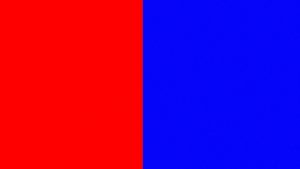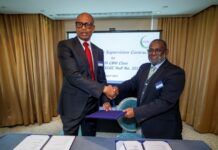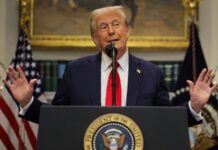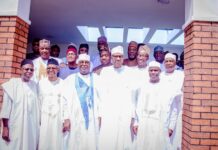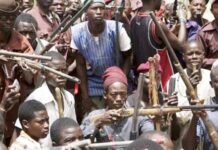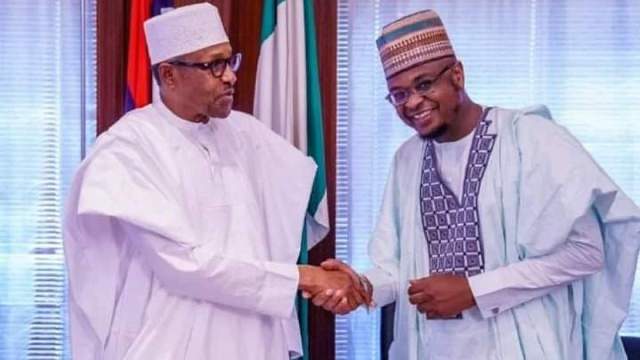The recent court pronouncement which branded the Islamic Movement of Nigeria (IMN) otherwise called Shi’ite a terrorist organisation and accordingly ordered its proscription by the federal government has received diverse reactions from legal practitioners.
Justice Nkeonye Maha of the Federal High Court in Abuja, on Friday issued the proscription order in a ruling delivered in an ex parte application brought by the federal government.
The federal government, it would be recalled had approached the court last Thursday in the name of the attorney general of the federation for the proscription order as protest by the group demanding the release of their leader, Ibraheem el-Zakzaky, turned violent.
It resulted in the death of many people including a deputy commissioner of police, Mr. Usman Umar and a Channels Television report, Mr. Precious Owolabi
In the ex parte application marked FHC/ABJ/CS/876/2019, the government prayed the court for “a declaration that the activities of the respondent (Islamic Movement in Nigeria) in any part of Nigeria amounts to acts of terrorism and illegality.
“An order of this honourable court proscribing the existence and activities of the respondent (Islamic Movement in Nigeria) in any part of Nigeria, under whatever form or guise either in groups or as individuals by whatever names they are called.
“An order restraining any person or group of persons from participating in any manner whatsoever in any form of activities involving or concerning the prosecution of the collective intention or otherwise of the respondent (Islamic Movement in Nigeria) under any other name or platform howsoever called or described in any part of Nigeria.
“An order directing the applicant (the AGF) to publish the order proscribing the respondent (Islamic Movement in Nigeria) in the official gazette and two national dailies.”
Maha in her ruling granted the application as prayed.
With the order, the court restrained any person or group of persons from participating in any form of activities involving or concerning the IMN under any name or platform in Nigeria.
However, reacting to the proscription order, human rights activist, Mr. Mike Ozekhome, described the proscription as discriminatory.
He noted that members of the IMN are only pressing for the release of their leader who is being held in custody by the federal government in spite of a valid court order for his release.
He said the government should show more seriousness in the fight against insecurity in the country by banning known groups and associations currently destabilising every part of the country, instead of those asking the federal government to obey court orders by releasing their leader.
“The proscription is highly discriminatory as in the case of Indigenous People of Biafra (IPOB).
“What group could be more terrorist than the herdsmen and their known anchor, Miyetti Allah Cattle Breeders Association that has held Nigeria down by the jugular for years, killing, maiming, burning, raping, turning Nigeria into a crimson field of bloodbath?
“Until the government bans and outlaws these, it is certainly not serious,” he said.
Ozekhome argued further that the Shiite group is a religious group, like the Sunni, which he said the president belongs as such cannot be proscribed.
“It is not an association that could be banned. Section 10 of the Nigerian Constitution makes Nigeria a secular state. You can’t ban religion, a people’s belief.
“There is also freedom of thought, conscience and religion in section 38, while sections 40 and 41 allow for freedom of movement and association.
“The Constitution is ruthlessly being shredded by an intolerant and overbearing civilian dictatorship,” he added.
For his part, a senior lawyer, Mr. Ahmed Raji, however called for caution on the part of all Nigerians, stating that the current security challenge in Nigeria predates the administration of President Muhammadu Buhari and as such would require the cooperation of all Nigerians to overcome.
He however lamented that the proscription would impact negatively on the economy as it would scare foreign investors away from the country.
“It is a delicate balance. The more we admit that we have a good number of terrorist organisations in our country, the more the foreigners will become wary of coming in to do genuine business,” he said.
Raji said though he detested the activities of some persons, but the society will gain more by embarking on a holistic approach to what he considered as major social problems.
“This administration met most of these problems. All hands must be on the deck to save our country and future. It is the future of our dear country that is at stake.
“The president means well for the country by my assessment and reading of him. Men of goodwill and substance should rally round and help to navigate out of the major social problems.
“In the face of dwindling resources, the little that we have should be channelled towards improving our decayed infrastructure instead of this self inflicted and avoidable internal crisis/strife. Nigeria must survive God willing,” he said.
Another lawyer, Mr. Johnmary Jideobi, described the proscription as unconstitutional and a nullity.
He argued that no arm of government has the right to take away the freedom of fellow Nigerians without a proper trial.
“Section 36(1) of our Constitution loudly proclaims and eloquently insists that everyone is entitled to fair hearing whenever the determination of his civil rights and obligations are to be determined by a court of competent jurisdiction impartially constituted.
“A clinical survey of all judicial authorities in Nigeria and other commonwealth jurisdictions shows that any decision arrived at by any court in circumvention of this fair hearing right cannot stand and should be declared a nullity. Such is the fate of the ex-parte order of the Federal High Court issued on the 26th of July, 2019 prescribing the Shiites as a terrorist organisation. In any event, the crime or offence of terrorism is created by the Terrorism Prevention Act, 2013 (TPA).
“Our constitution declares that it is only when a court of law finds a citizen guilty of an offence that conviction and sentencing can follow. Unfortunately, the ex-parte order of the Federal High Court appears not to have reflected this constitutional safeguard in that without any plenary criminal trial the Shiites have been found guilty of being “terrorists” which is a grave label world over.
“This is because, the ex-parte of proscription has a somewhat perpetual effect of which under our laws an ex-parte can only last for a few days. In fact, the Federal High Court Rules itself proclaims in the clearest of language that every ex-parte order expires after 14 days of its issuance.”
Jideobi questioned the failure of government to respect the order for the release of the Shiite leader, El-Zakzaky and described the recent move as overstepping boundaries.
“Being labeled a “terrorist” presupposes that you have been tried and found guilty of the offence of terrorism by a court of competent jurisdiction. The National Assembly (nay the TPA) goofed by attempting to proclaim any person or group of persons “terrorist” or “terrorist group” by an ex-parte order without a proper criminal trial thereby sidestepping that time-hallowed process of determination of the guilt or innocence of a criminal suspect sanctioned by the Constitution itself.
“The TPA punched above its weight. No doubt, it is a constitutional taboo, if not a legislative apostasy, that its victims [such as the Shiites] ought to put squarely before the Court. This can only be so for even a state organ [such as the National Assembly] is without powers to bludgeon the fundamental rights of citizens, F.R.N. vs. Ifegwu (2003) 15 NWLR (Pt. 842) 113 at 185. It is in the light of the foregoing that the proscription of the Shiited group as a terrorist organisation must be viewed and understood.
“Lastly, questions must be asked why a government that prides itself as Rule of Law-compliant obstinately refused to comply with the valid and subsisting Order of the Federal High Court directing the release of the El-Zakzaky (the Shi’ites Leader) which by the way has been the major (if not the sole) plank of their relentless protests,” he said.
However, another lawyer, Monday Ejeh, said the actions of the group in recent times warranted the steps taken by the government.
“A quick look at Section 1(1) and (2), particularly Section 1(2)(b),(i),(ii) and (iv); Section 1(2)(c),(iii) and (v) of the Terrorism (Prevention) Act, 2011 show that the activities, and in recent times, the protests of the IMN (Shiites) are such that can be classified as terrorist acts. Recall that it was not under this government the said law was made.
“I am aware that some pundits are of the view that since the IMN or Shiites is a religious group and Nigeria is a secular state, it is a breach of the provisions of Sections 38 and 40 of the Constitution of the Federal Republic of Nigeria, 1999 as amended, which provisions guarantee our rights to thought, conscience and religion; peaceful assembly and association.
“Let me however state that rights, freedom and liberty are simply political privileges as allowed by the body polity and as codified in the Constitution. In fact, no right or freedom is absolute and or exclusive of the rights, freedom and liberties of other good people of the Country.
“So while exercising our rights, we must ensure that such exercise of our rights does not lead to the infringement of the rights of other people. For example the IMN (Shiites) exercise of their right to associate freely and to a religion of their choice was exercised against and did trample the right of the Chief of Army Staff and his convoy to move freely in Zaria. This to me was where the issues arose from.
“It is for this reason that Section 45 of the Constitution provided that laws such as the Terrorism Prevention Act, 2011; which provisions fix the IMN (Shiites) into a terrorist grouping, are justifiable in our Country as the law seeks to have been implemented in this circumstance in the “interest of defence and public safety.”
For its part, IMN described the proscription as “absurd.”
Spokesman for IMN, Mr. Ibrahim Musa said leading members of the group were studying the court’s ruling.
“As regards the court orders proscribing the Islamic Movement in Nigeria, for now, the movement hasn’t reached a decision.
“The leading members and lawyers are studying the court order and very soon, they will issue a way out for the movement.
“But we believe we are the victims of all that has been happening so it is very unfortunate that a group that has not retaliated, all the killings it has suffered under the President Muhammadu Buhari’s administration, it will now be accused of being a terrorist group,” he said.
With ThisDay, Premium Times reports
